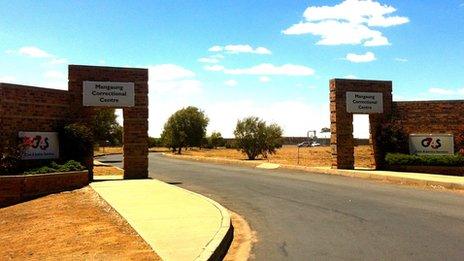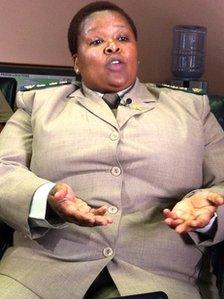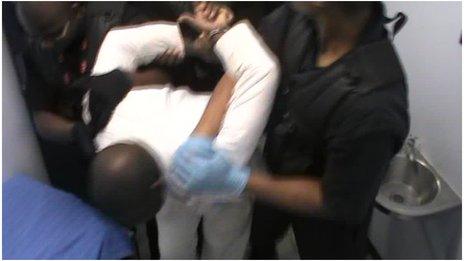'Shocking' abuse claims at South Africa's Mangaung prison
- Published
Disturbing footage has been leaked from inside the prison, as Andrew Harding report
"We stripped them naked and throw them with water so the electricity can work nicely... some of them would black out.
"So we would pour water on them... and then we would go again."
This is the account of "Mpho", a South African man in his mid-thirties, who, under condition of anonymity, has admitted his part in what he calls "common practice" at the Mangaung correctional facility.
He was until recently an emergency security team member at the maximum-security jail, which is the only one is South Africa that is run by British security firm G4S.
'Loss of control'
The South African government has taken over the prison, as a temporary measure, to tackle what they called a "loss of effective control" by G4S.
The government says it is currently investigating accounts of punishment using electric shocks and forced injections.
G4S for its part says it has seen no evidence of these practices, denies that they are widespread but is investigating the allegations.
On the available evidence, it is difficult to prove whether or not Mpho's harrowing account illustrates standard practice at Mangaung, which houses nearly 3,000 inmates.
At the Wits justice project, external at Wits University in Johannesburg, researcher Ruth Hopkins shows a pile of letters on her desk.
"Over the last year I have interviewed and received letters from nearly 30 inmates who told us about electroshocking and beatings," she says, "as well as 14 members of these security teams, and accounts from regular warders in the prison."
She adds that "inmates complained about broken limbs, blood in their urine and other serious injuries.
"Some said they would pass out when the shocks became too intense."
Some of the evidence is difficult to watch. The BBC has obtained leaked footage filmed inside the prison, in which one can hear the click of electrified shields, and shrieking.
The inmates shout "stop" in the local language of Sotho, while the guard tells him "I am doing my job".

Industrial action
After 300 warders went on strike protesting at the sacking of colleagues, G4S says it offered to engage with them on safety concerns and complaints about the violence inside the prison, on the condition that the warders returned to work.
The warders refused, and so were fired.
It is this industrial action that G4S points to as the catalyst for both a recent rise in violence at the prison, and for sacked workers to come forward with accounts such as the above.
Mpho's justification for such inhumane behaviour is the extremely violent nature of the prison, where several warders have been overpowered and taken hostage by inmates, stabbed or even raped.
He and other warders who have spoken to the BBC allege they didn't have enough staff or protection to deal with the maximum-security prisoners they were working with.
"We want them to be afraid of us," he says, "because we are few."
When asked about allegations of electric shocking and beatings, Andy Baker, the regional president of G4S for Africa told the BBC that he "doubts if it is possible that it was widespread".
"We work with complete transparency and if there were these types of extreme abuses it would be there for all to see," he said.
However, Mr Baker did concede a "difficulty in an environment with so many people and so many moving parts, to categorically state that there has never been somebody stepping over the line".
"To my knowledge, there has never been an abuse of this type or nature," he said.
Who knew?
The embattled British security firm G4S was given the contract to run the prison in 2000.

Nontsikelelo Jolingana: We are investigating
It is one of two in South Africa which are privately run.
At her office in South Africa's administrative capital Pretoria, the acting national commissioner of correctional services, Nontsikelelo Jolingana, says a government team is now in place at the prison.
"It's quite shocking information that's coming to the fore but we are investigating, and until then we can't say what is the appropriate intervention to deal with the situation," she told the BBC.
However, as long ago as 2010, concerns were being raised about the prison.
A leaked government report seen by the BBC protests the "brutality" of the security teams and the electroshocking used, as well as the infrequent visits of the head of the prison to the cells.
It compares the prison to "Quantanamo" (sic).
When asked why the government did not intervene, Ms Jolingana could only repeat that she is "investigating".
Forced injections
"As well as electric shocking, we have received nearly 20 complaints of forced injections - that is, involuntary medication with powerful anti-psychotic drugs, with serious side effects," says Wits researcher Ruth Hopkins.
"Emergency security team warders have further told us that they would assist in administering forced injections up to five times a week.
"This is highly illegal as forced medication is only allowed if the patient is incapable of making an informed decision, or is a danger to himself or others."
Leaked footage filmed inside the prison shows a prisoner, Bheki Dlamini, chatting and co-operating with the demands of a team of guards.
When he realises he is to be injected he resists.
"I don't want this injection… they are like injection for horses," he says. Held down by the guards he shouts "No, no, no".
Punishment
Egon Oswald is a lawyer acting on Mr Dlamini's behalf in a civil case against the government, G4S and the healthcare providers in the prison.
He says that in one instance, Mr Dlamini was injected after complaining about nothing more than the food.
"It seems that in Mangaung prison these injections are used as a method of punishment or control, rather than what they are meant for, which is to deal in rare cases of extreme psychosis."

Leaked video footage shows prisoner Bheki Dlamini resisting an injection
If it is used as a method of control, does it work? I ask him.
"Well he won't be asking again," he says.
Mr Oswald says he has 14 other similar complaints that he is looking into.
Andy Baker of G4S made it clear that administering and prescribing injections is not the domain of G4S staff, but of independent medical staff.
In a statement to the BBC, G4S said while the video could not be verified, the company "takes such allegations very seriously and will be launching our own investigations into the matter".
A government investigation into the prison will present its preliminary findings at the end of October. It is not yet clear if they will be made public.
- Published15 December 2011
- Published19 August 2011
- Published29 October 2010